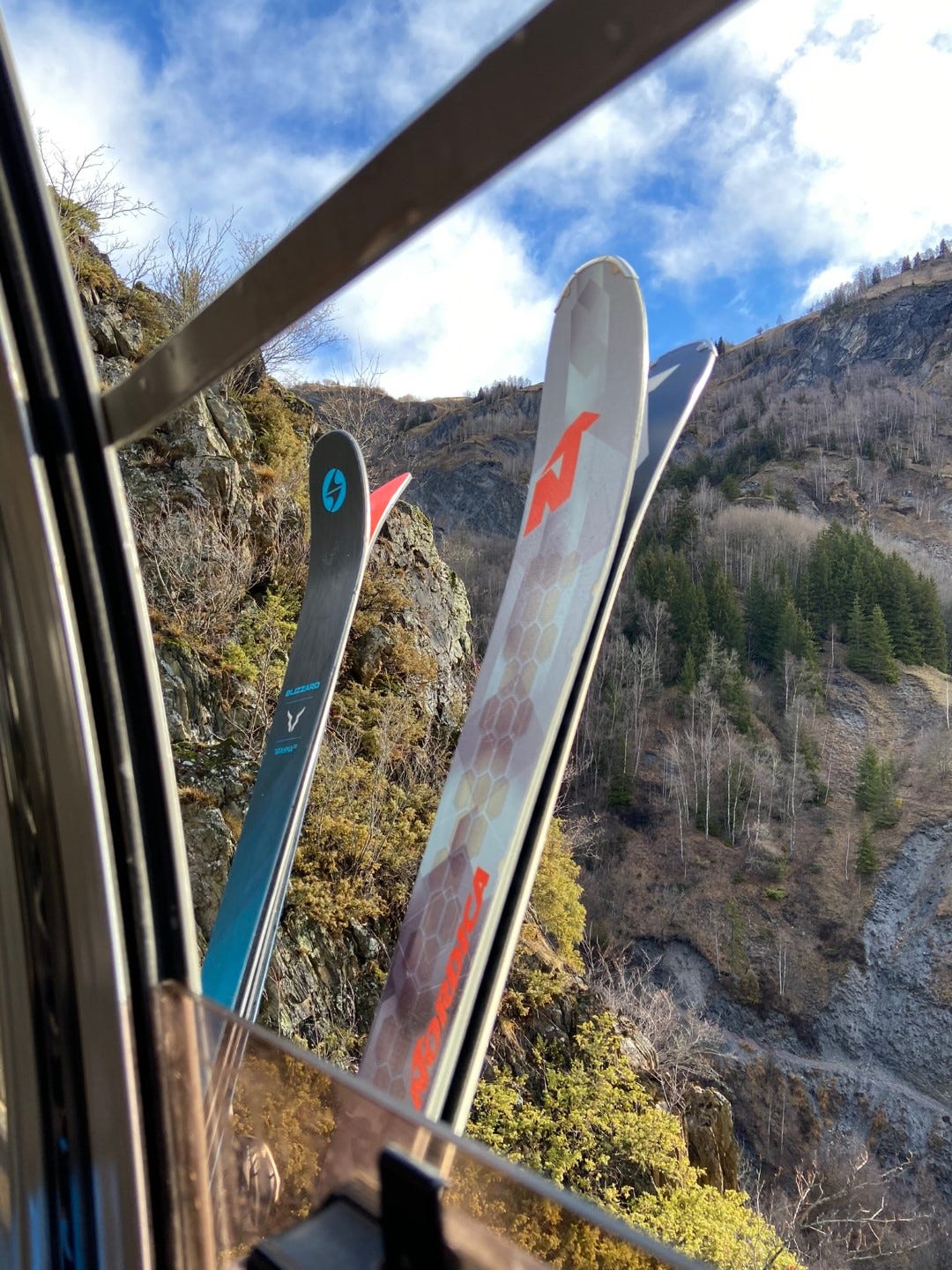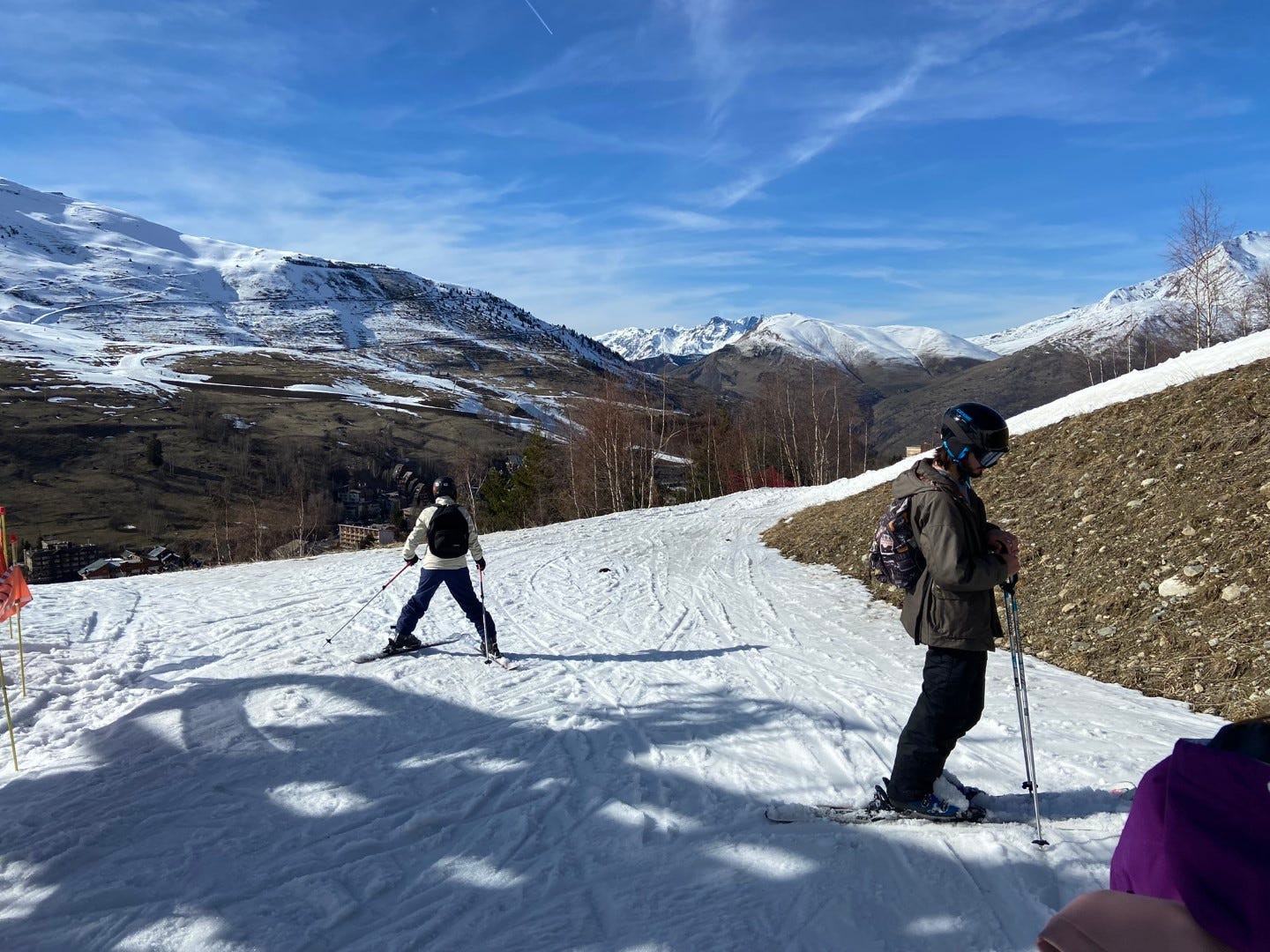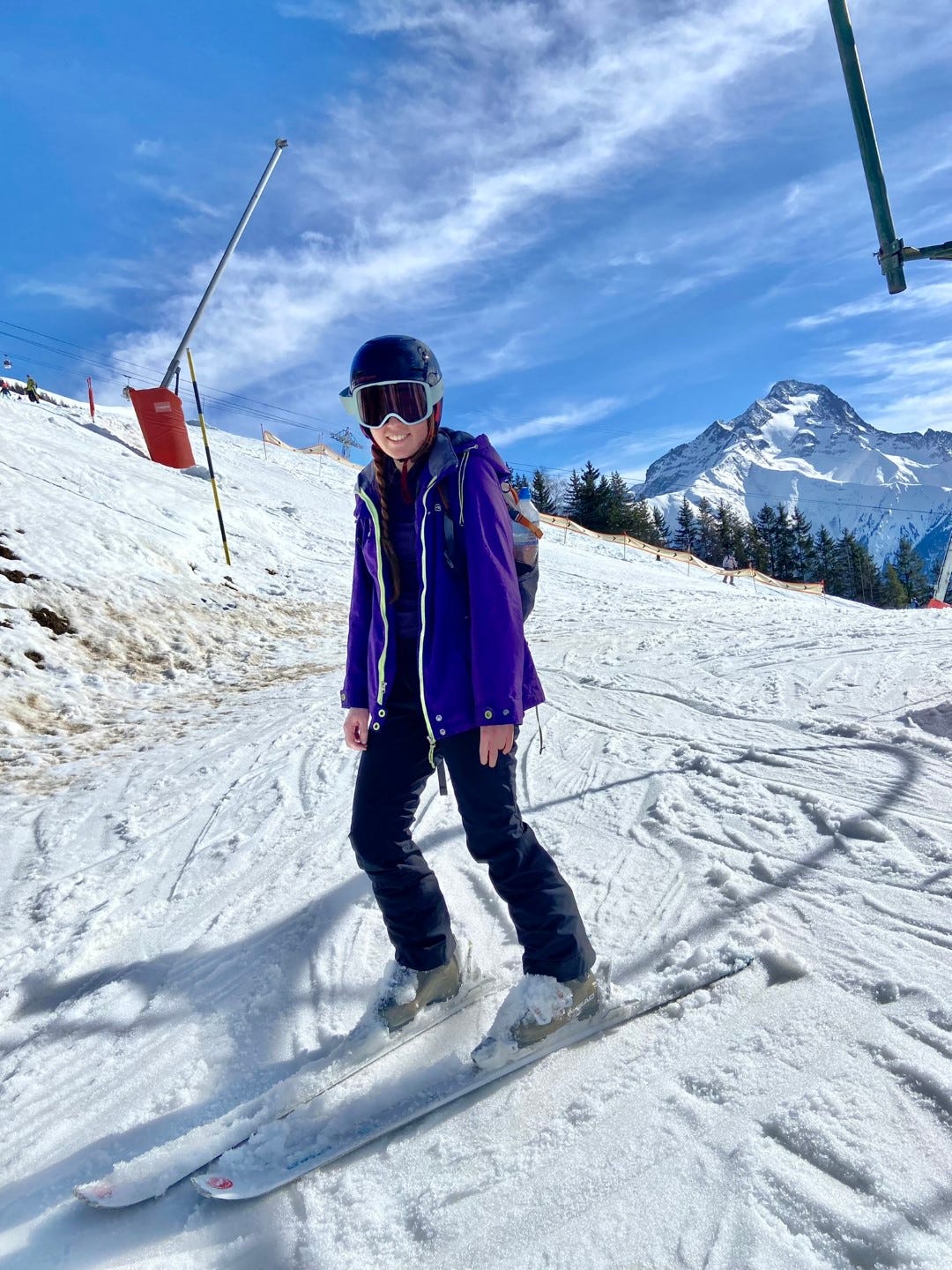Grenoble is the gateway to the French Alps. It is less than an hour’s drive from the closest ski stations, and you can even get public transport to most of them. The second-most common follow-up question to the one about where I live is thus whether I ski. In fact, I don’t. Despite living within a couple hours of ski resorts for most of my life, I only ever tried cross-country skiing, which is glorified hiking. Ah, but you will! is the reply, and despite some trepidation, I agree. It’s the done thing in Grenoble—and here, you don’t have to sell your first-born child for a forfait de ski.
The most common follow-up question to where I live is whether I speak French. Now, the answer is un peu, or perhaps, J’apprends. Before November, when I accepted the postdoc and immediately downloaded Duolingo, the answer was non. I took two years of high school Spanish because it seemed more practical than French, even though I had always found that language romantic. I had no way of knowing that over a decade later I would be living in France. The language of academia is English, so my job doesn’t require me to speak French, but I want to learn it, I tell the asker. You’ll pick it up so fast! they say.
Before I arrived in March, I was told the ski season lasts until maybe April, but that the snow in the Alps has been terrible this year. I had seen headlines about resorts having to manufacture nearly all of their snow. So I assumed it was unlikely I would get a taste of skiing until next season. I didn’t mind this buffer, because I’m naturally more of a wanderer than a high-intensity adventurer when it comes to the outdoors. However, within days of moving into my new apartment, there was a snow-dump forecast and my roommates were planning a weekend ski trip. I took them up on their invitation.
Back in November, it only took me a few weeks of Duolingo to internalize the fact that “Je suis américaine” and “Je mange un croissant au petit-déjeuner” were just scraping a few snowflakes off the tip of a language iceberg. What had I signed up for by deciding to move to France? Translating a life. I started to realize how much I take my everyday language for granted, the ease of connecting with people, completing transactions, joining new clubs, worshiping at church—in Cambridge I held poetry readings, for goodness’ sake. Sure, maybe people in Grenoble, an international university town, are slightly better at English than the recalcitrant French stereotype. But I knew the complexities that I had spent my life learning and cherishing in English were wayyy down there in the French iceberg. I had to hope it would get easier in France.
Cut to a partly sunny day on the gentlest, somewhat slushy slope in Les Deux Alpes ski station. I snap my boots into the skis for the first time and my roommates begin to explain how to move successfully on skis. They start with the pizza slice, of course; even I knew about that move. Heels wide, wider, knees even closer together. There. I take my first little pizza slice slide down the not-steep hill next to some tiny kids. Not bad. Next: turning. You have to lean on the opposite ski from the direction you want to turn, they say. This does not compute. My feet want to do ice skating, which it turns out is the opposite of downhill skiing, and my hips have forgotten what right and left are. I have not yet gotten the hang of turning when another novice in our group, who seemed to get it on the first try, is ready to try a real beginner’s slope—une piste verte, a green slope. I don’t want to get left behind so I follow them to the tow rope.
I’m generally good at imitating pronunciation, which I always attributed to my musical training. French pronunciation has challenged that self-perception. The oblong vowels and masquerading clusters of dropped consonants have taken a long time to settle. I still tentatively swap different versions of e and u, or I forget not to say the “ent” in plural verbs. I trip between guttural r’s and nasal vowels and the hard t slipped in with that feminine noun. This has been humbling in a way I’m more used to feeling while learning physical skills. Gymnastics classes as a kid were a healthy contrast to the ease of absorbing school subjects. In my one social dance class in college, I could not immediately imitate a foxtrot step; I had to visualize it repeatedly until muscle memory finally kicked in. I still have trouble accepting that the unfamiliar French sounds fighting with each other in my throat are more like learning dance steps—or which muscles make just the right lean to turn the skis.
After completely flopping when I first try the tow rope, I’m at the top of the green piste. This one is much steeper. To get down with any semblance of control, I’ll have to do the skiing thing, which is to zig zag, i.e. turn. I watch my roommates demonstrate, scoot to the tipping point, and start to move. I lean clumsily as I pick up speed and promptly topple to one side. This is good, falling is part of it, I fell exactly the right way, the snow is soft, right? Getting up is harder, fighting with slippery snow and immobile ankles, pushing with my arms and glute and obliques and putting almost breaking-point pressure on ankle and fingers as I hoist myself up. Getting up will turn out to be the most physically challenging part of skiing—because I am going to fall a lot.
Duolingo has a motivational quote somewhere in its buffering screen tips about how you learn most from your mistakes. This is easy enough to take when you just get a little downward ding and lose a heart, but for a perfectionist like me, being at a loss (i.e. sounding stupid) while speaking to someone is another matter. It is without question my biggest weakness when learning a language—I knew even during high school Spanish, when I refused to practice speaking with my dad’s Spanish-speaking colleague, that I was limiting myself. And still, on arrival in France, I found myself speaking almost no French at all. I had no idea what other people were saying. I defaulted to “Parlez-vous anglais?” (which took me several weeks to discover I was pronouncing incorrectly) and stuck with English at work. I was so terrified to call a French doctor’s office and be answered with French that I scoured the online network to find an open appointment bookable online. I knew I should try to speak more, but when I also knew it would consist almost entirely of tongue-tying and nonplussed squinting, I couldn’t bring myself to.
Is there any good in going on a piste that you really aren’t ready for? After a few more goes on the green piste (half falls, half progress, some little synapses starting to form), the group wants to try one higher up the mountain. Long story short, despite promises, we end up at the top of a blue piste, the next level up from green. If the first green piste was daunting, this is Everest. I know I can’t control my turns enough to ski down. But I also know that it isn’t one long straight slope; if I go horizontally enough around the little hillocks of heavy, sun-glazed snow I can just keep falling sideways and eventually flub my way to the bottom. So I go. And despite my efforts, it is fast. I tumble face first a few times, rolling in ways I can’t recreate mentally, joints pulling in undesired directions, but am never actually injured because the skis release. This means having to snap them back on in the steep, slick snow, and even with my roommate’s generous help, I am simply physically incapable of doing it and have to walk to a less steep spot. By the time I get to the bottom, the only thing I’ve learned is how to keep moving when I’m nearing my limit—which, I suppose, isn’t nothing.
Any illusions that I would quickly absorb French just by listening to native speakers talk have been dispensed with. I do get to listen to a lot of French. My coworkers, though they can speak English, prefer to socialize in French. At church, while my friend translates, I hear two hours of French at a stretch. I eavesdrop on the tram. But even a month later I can only pick out words here and there among all the liaisons and elisions and slang. And conversations don’t come with captions (I’m much better at puzzling out written French, alas). I know better than ever that it won’t be automatic; I have to speak, I have to study, I have to flub. Listening to international friends who, after a year or two here, are chattering away in French, is very much like watching skiers zag past me with ease and imagining all the months of muscle fatigue and falls it will take to get there. It would be so easy, like some other international friends, not to prioritize it, to step back from the slope and make do with English and a scattering of French phrases.
My roommates have found a way to the chairlift that goes to a high-elevation green piste. “What if I’m done?” I say to my moral support roommate, genuinely wondering if I have it in me to make it back down. He looks sympathetic—but then, somehow, I decide I want to try. I make it onto the chairlift—my first—without getting a ski caught. We glide up away from the slushy snow and the theme-park-like lift queues, higher into the crystalline air where we can see the Belledonne massif arrayed around us. The promised green piste is much more extensive with several stages (really not unlike Mariokart). Although it’s closer to my level than the blue piste was, there is a new hair-raising element: an actual edge to tumble over if I lose control. Some sections are also narrow enough to make wide turns difficult, thus inducing me into ever faster speeds. I have to recruit all my remaining muscle power and focus. Some of my turns do end in falls, but I don’t go over the edge, and my control actually improves as I go. The last stage widens into a deliciously broad hill where I can turn as wide as I want, and I manage to do so many turns in a row (leaning with all my strength and avoiding the zoomers and the chains of kids in ski school groups) that I’m running out of breath and muscles are trembling. It is, I will admit, a decent finish.
After a month of feeling like my French may actually be regressing in France, I finally got organized enough to look into French courses. By a stroke of luck, a traditional course at roughly my level (“A1 in progress”) and subsidized by my employer was starting the next day and I was welcome to join. I also found a private coach, recommended by a friend, who emphasizes speaking and using everyday pop culture and social media to practice. I went to class and spoke for two hours straight—easier when conversation partners are at roughly the same level, but still a confidence boost—and my Instagram algorithm has gradually been piling on the French reels. More phrases are starting to link up. At a social event the other day, I kept French exchanges going two or three sentences before reverting to English.
I’m still just at the top of the piste, looking down—a green piste with edges, perhaps, rather than the blue (let alone black) for now. But I have started to go.
As for my first time skiing, my entire body was sore for several days afterward—more from the getting up than from falling. But my body was fine. I know that if I wanted to make the most of my ski seasons here, I would snag at least one more snowy weekend and reinforce the synapses that my leaning muscles made. Then again, just thinking about it makes me feel exhausted, so I think I’ll call it a season and try again next winter.
P.S. I’m at a 160 day streak in Duolingo :)










You are a beautiful writer, Anne. I love how you discussed these two subjects side-by-side to elucidate the struggles and hazards of learning something new. Both skiing and language have a huge learning curve. It took me 6 or 7 attempts at skiing to actually enjoy the experience. As for language, I took 2 years of Spanish at BYU and retained very little. I think you are doing it the right way to achieve fluency. Don't give up on either! You have the valuable trait of facing challenges undeterred. This has and will serve you throughout your life. Age sometimes tempts one into complacency. Don't let it happen!
This was a fun read. Thanks for inviting me onto your substack. I look forward to reading future posts.
Holy smokes! This really is a story born of experience! Learning to ski and learning a language are two skills that are talked about so often in the world at large, that it's easy to forget that they take a lot of effort and determination. I admire your willingness to jump in so bravely.
This may or may not be the appropriate place to mention this (appropriateness is also a learned skill that I never mastered). But the language challenge reminded me so much of my mission experience. The language alone was daunting for me, but the pressure to learn within several weeks, not only to converse, but to teach gospel principles, was overwhelming. True, I had all kinds of moral support, and backups in the field. But, like you said, the realization of being put on the spot repeatedly (along with my pre-existing social phobias) was brutal. Like you, I also had a stark revelation of just how much I'd taken the ability to communicate for granted! But it sounds like you are in the thick of it, and fighting hard. Easy for me to say, but I believe you will prevail. Good luck! (as if luck had anything to do with it).